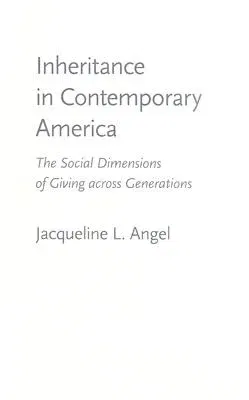With the baby boom generation on the cusp of retirement, life
expectancies on the rise, and the nation's cultural makeup in flux, the
United States is faced with social and policy quandaries that demand
attention. How are elders to balance the competing claims of helping
family members during their lifetime, saving for old age, and planning
estates? What roles should the state, family, and individuals play in
supporting people during later life? Are new familial gift-giving trends
sustainable, and, if so, what effects might they have on future
generations?
Inheritance in Contemporary America tackles the complex legal, policy,
and emotional issues that surround bequests and inheritances in an era
of increasing longevity, broadening ethnicity, and unraveling social
safety nets. Through empirical analyses, case studies, interviews, and
anecdotes, Jacqueline L. Angel explains the historical nature of
familial giving and how it is changing as the nation's demographics
shift. She explores the legal, personal, and policy complexities
involved in passing wealth down through generations and provides a
cross-disciplinary context for exploring the indelible effects that
newly unfolding inheritance practices will have on various societal
cohorts and the nation in general.
From nuclear and extended families to the state and nongovernmental
bodies, Angel's engaging study explores how attitudes toward giving are
evolving and confronts in stark terms the legacy that these shifts in
attitude will leave. This book will be a vital tool for scholars and
practitioners in gerontology, sociology, psychology, anthropology,
economics, political science, and public policy.

